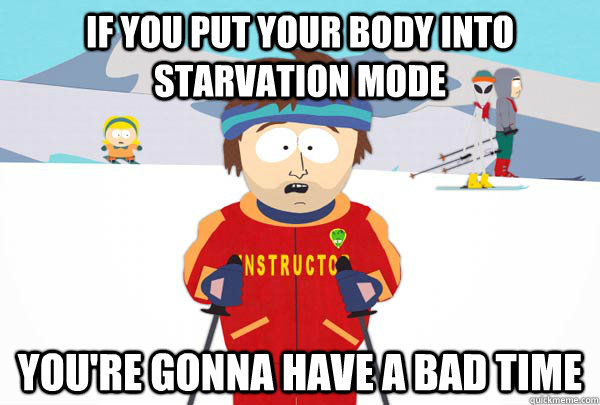Starvation MODE MYTH BUSTED
Replies
-
Discussion is one thing. Saying that he "doesn't even look like a personal trainer" is rude. As well as other comments. The dietician at my old job certainly didn't look like she knew about healthy eating... but she is a smart & beautiful person and I would never judge her knowledge based on her appearance.
Have you seen his other posts in other threads???0 -
 0
0 -
How does the OP prove anything? What about hormonal adaptations from long term VLCD? What about down regulation of metabolic function? None of that is addressed.0
-
I once "personally trained" a dude0
-
Never knew you had to look a certain way to get an education. Maybe you should read my profile before judging. My certification is on there too btw. Some people are so narrow minded. Do I look like I have an IQ of 199, a black belt in Tae Kwon Do, a brown belt in Shotokan Karate, I used to play baseball, football, and basketball? Probably not, but hey, I guess we all have to look the part don't we. SMDHby the way OP you dont look like a personal trainer.
:drinker:0 -
Ugh, it's too late for this, but I'm here to help so, You can find the source in most books on bodybuilding and such, but a simple answer to save you time, is because protein synthesis starts 3 hours after ingesting it, therfore 3-4 hours between protein intake is optimal since your body begins breaking it down for use.
Lol, yes I titled it wrong. But, look at the last paragraph. It says that when your body isn't getting a constant flow of protein every 3-4 hours it draws protein from other organs, thus in turn taking it away from muscle tissue in order to feed more protein to the vital organs which need protein more than muscle tissue.The title says 'myth busted' - all I see is a blog about protein synthesis. How is this dispelling any myth or proving it for that matter?
ETA: I am not disagreeing that this happens, I am just unsure of what this proves.
Where is the 3 - 4 hour time period from? Can you find a source for that?
Protein synthesis happens for a lot longer than 3 - 4 hours after ingestion. In fact it increases after 4 hours up to a period of about 24 hours.
http://www.ncbi.nlm.nih.gov/pubmed/85636790 -

Agree.....we have beat this dead horse over and over..........
LOL AT THIS..i am going to post a topic - breakfast is the most unhealthy meal just to see what kind of response I get that one will be freaking hilarious...0 -
 0
0 -
 0
0 -
Eric, good morning I hope you are well and enjoying your Friday. With regard to your question, our bodies operate off a feedback system and part of that is a negative feedback system. Our bodies need a certain amount of calories to function. For example in the average 150 pound person the liver needs 650 calories per day, brain 380, heart 270, lungs 160, etc. The first area which will be depleted are our 200 to 400 grams of stored muscle glycogen roughly 800 to 1,600 calories. Then our bodies can turn to catabolizing muscle in the form of BCAAs which can be metabolized in the alanine cycle into a metabolite that can be used like glycogen. Then our bodies can turn to intramuscular fat stored as free fatty acids. Finally our bodies can turn to their safeguard back up adipose tissue. If a person was 200 pounds and 40% body fat they would have 80 pounds of fat or approximately 280,000 calories of stored energy.
The danger in not eating is that you jeopardize losing weight in water stored with lost glycogen and muscle. So if this 200 pound person at 40% body fat lost 20 pounds and dropped to 180 pounds but still had 80 pounds of fat, now rather than being 40% body fat the person would be 180 pounds at 50% body fat. Then they person gives up and gradually gets back to 200 pounds and a bit more 205. The weight gain will be water and fat not muscle so now they could add back 15 pounds of fat so now they could be 205 pounds with 95 pounds of fat.
As you can see not a good cycle that occurs when attempting to not eat.
We hope this helps to clarify the matter.0 -
Love the lack of reading comprehension. I said, it start at 3 hours. Never said how long it lasted, but actually it lasts for 48 hours.
Ugh, it's too late for this, but I'm here to help so, You can find the source in most books on bodybuilding and such, but a simple answer to save you time, is because protein synthesis starts 3 hours after ingesting it, therfore 3-4 hours between protein intake is optimal since your body begins breaking it down for use.
Lol, yes I titled it wrong. But, look at the last paragraph. It says that when your body isn't getting a constant flow of protein every 3-4 hours it draws protein from other organs, thus in turn taking it away from muscle tissue in order to feed more protein to the vital organs which need protein more than muscle tissue.The title says 'myth busted' - all I see is a blog about protein synthesis. How is this dispelling any myth or proving it for that matter?
ETA: I am not disagreeing that this happens, I am just unsure of what this proves.
Where is the 3 - 4 hour time period from? Can you find a source for that?
Protein synthesis happens for a lot longer than 3 - 4 hours after ingestion. In fact it increases after 4 hours up to a period of about 24 hours.
http://www.ncbi.nlm.nih.gov/pubmed/85636790 -
Love the lack of reading comprehension. I said, it start at 3 hours. Never said how long it lasted, but actually it lasts for 48 hours.
Ugh, it's too late for this, but I'm here to help so, You can find the source in most books on bodybuilding and such, but a simple answer to save you time, is because protein synthesis starts 3 hours after ingesting it, therfore 3-4 hours between protein intake is optimal since your body begins breaking it down for use.
Lol, yes I titled it wrong. But, look at the last paragraph. It says that when your body isn't getting a constant flow of protein every 3-4 hours it draws protein from other organs, thus in turn taking it away from muscle tissue in order to feed more protein to the vital organs which need protein more than muscle tissue.The title says 'myth busted' - all I see is a blog about protein synthesis. How is this dispelling any myth or proving it for that matter?
ETA: I am not disagreeing that this happens, I am just unsure of what this proves.
Where is the 3 - 4 hour time period from? Can you find a source for that?
Protein synthesis happens for a lot longer than 3 - 4 hours after ingestion. In fact it increases after 4 hours up to a period of about 24 hours.
http://www.ncbi.nlm.nih.gov/pubmed/8563679
No need for the snark - uncalled for. My point is, why is 3 - 4 hours optimal if protein synthesis is at its highest 24 hours later?
Sorry if my IQ is not as high as your 199!0 -
Do I look like I have an IQ of 199

Thank you. Thank you so much.0 -
Actually, I do think it's a fair comment that a personal trainer should be in good shape. Not saying I completely agree with it, I suppose there can be some exceptions.
But I wouldn't hire a personal trainer who was overweight, like the OP (at least based on his profile pic). I think anyone can get a certification. What's more important is to show you know what you're doing. You can talk the talk AND walk the walk.
Diet is 80% of the battle. "Do as I say, not as I do" does not sound like a very inspirational motto for a fitness trainer.
--P0 -
Eric, good morning I hope you are well and enjoying your Friday. With regard to your question, our bodies operate off a feedback system and part of that is a negative feedback system. Our bodies need a certain amount of calories to function. For example in the average 150 pound person the liver needs 650 calories per day, brain 380, heart 270, lungs 160, etc. The first area which will be depleted are our 200 to 400 grams of stored muscle glycogen roughly 800 to 1,600 calories. Then our bodies can turn to catabolizing muscle in the form of BCAAs which can be metabolized in the alanine cycle into a metabolite that can be used like glycogen. Then our bodies can turn to intramuscular fat stored as free fatty acids. Finally our bodies can turn to their safeguard back up adipose tissue. If a person was 200 pounds and 40% body fat they would have 80 pounds of fat or approximately 280,000 calories of stored energy.
The danger in not eating is that you jeopardize losing weight in water stored with lost glycogen and muscle. So if this 200 pound person at 40% body fat lost 20 pounds and dropped to 180 pounds but still had 80 pounds of fat, now rather than being 40% body fat the person would be 180 pounds at 50% body fat. Then they person gives up and gradually gets back to 200 pounds and a bit more 205. The weight gain will be water and fat not muscle so now they could add back 15 pounds of fat so now they could be 205 pounds with 95 pounds of fat.
As you can see not a good cycle that occurs when attempting to not eat.
We hope this helps to clarify the matter.
So it's only an issue if they gain weight again...so your advising people to just stop eating completely? GREAT ADVICE!0 -
Hmmm what happens when we are sleeping?
 0
0 -
I'm starving lol just saying! You would need to not eat for days to go into actual starvation mode. I'm no expert but thats what I read. Realistically it makes sense.... Now when I had my body fat tested the tester told me it is EXTREMELY hard to make gains while practicing IF etc. This I feel is more correct but the whole my body is in starvation mode because I didn't eat for 3-5 hours seems extreme.0
-
Starvation mode is indeed real. But what EVERY SINGLE PERSON ON MFP talks about is actually MALNUTRITION.
NO ONE here talks about Starvation Mode (studied by military to push the limits of soldiers in super low calorie, super high energy expenditure, super low body fats).
Now, the reason why people with super low calorie intakes like 599-800 as the second poster mentioned, still lose weight is the following...
Proteins, vitamins, and minerals are needed to make the body function. When you have too few of them, the body simply cannot do certain things it normally does and thus will NOT spend the energy to do so. So, those that eat too little and stall basically matched their calorie deficit with the reduced energy expenditure of their body. If they lowered their calories by 1000 and their body is now spending 1000 less because it can no longer do certain functions due to lack of supplies, the deficit is now 0.
Those that eat VERY low and continue to lose weight broke through that. Sure, their body is spending 1000 less calories a day, but if they are eating 1500 less, that is still a 500 deficit.
One study that was floating around here a while ago had a guy eat NOTHING, 100% pure starvation, for a YEAR. EVERY day he had his blood work done and given vitamin and mineral injections and supplements to ensure he got plenty of nutrition. But still lacked protein. His metabolism slowed 50% to 60% over this time.
Anyway...
MALNUTRITION..0 -
Oh yeah...
And protein is broken down ONLY in the stomach. In order to digest it, the proteins must be denatured. To do this, they are soaked in hydrochloric acid that is in the stomach. The stomach grinds up the protein and eventually digests it. This process takes a while and is why protein makes us feel full longer than other foods. This also helps to slowly release protein into the body, so that there is a steady state of availability.
Other foods simply pass through the stomach and are digested throughout the intestines.0 -
 0
0 -
Amen brother:) I appreciate all the information, thank you much! denise PS btw, to hell with looking like Holly'weird thinks we should look:bigsmile:
Never knew you had to look a certain way to get an education. Maybe you should read my profile before judging. My certification is on there too btw. Some people are so narrow minded. Do I look like I have an IQ of 199, a black belt in Tae Kwon Do, a brown belt in Shotokan Karate, I used to play baseball, football, and basketball? Probably not, but hey, I guess we all have to look the part don't we. SMDHby the way OP you dont look like a personal trainer.0 -
This may be true but people who are eating still have malnutrition which I believe is what some folks refer to as "starvation mode". Same with dehydration, you can be drinking water but not enough and actually be dehydrated.
deniseI'm starving lol just saying! You would need to not eat for days to go into actual starvation mode. I'm no expert but thats what I read. Realistically it makes sense.... Now when I had my body fat tested the tester told me it is EXTREMELY hard to make gains while practicing IF etc. This I feel is more correct but the whole my body is in starvation mode because I didn't eat for 3-5 hours seems extreme.0 -
If I understand it correctly, the "starvation mode" idea means that you actually convert the caloric intake into fat as the body believes it has to sore energy as it is starved. And that is definitely a myth with no basis in reality.0
-
This stuff is so interesting and I am the type that wants to know what is "actually" going on in my body! Thank you Dana:) deniseOh yeah...
And protein is broken down ONLY in the stomach. In order to digest it, the proteins must be denatured. To do this, they are soaked in hydrochloric acid that is in the stomach. The stomach grinds up the protein and eventually digests it. This process takes a while and is why protein makes us feel full longer than other foods. This also helps to slowly release protein into the body, so that there is a steady state of availability.
Other foods simply pass through the stomach and are digested throughout the intestines.0 -
I've seen a lot of people on this forum discuss "starvation mode" as different things. Is there an accepted definition? If you're going to bust a myth you have to establish what it is first.0
-
 0
0 -
Lol, yes I titled it wrong. But, look at the last paragraph. It says that when your body isn't getting a constant flow of protein every 3-4 hours it draws protein from other organs, thus in turn taking it away from muscle tissue in order to feed more protein to the vital organs which need protein more than muscle tissue.The title says 'myth busted' - all I see is a blog about protein synthesis. How is this dispelling any myth or proving it for that matter?
ETA: I am not disagreeing that this happens, I am just unsure of what this proves.
Where is the 3 - 4 hour time period from? Can you find a source for that?
That needs a source and what really is missing is that your body doesn't digest protein immediately and in fact it takes quite a while. Therefore, you eat some protein like casein for breakfast like cottage cheese, your body is going to get a steady stream of protein from your digestive system and that there is absolutely no need to eat 5 or 6 meals a day, but that 2-3 meals per day is more than adequate to provide steady protein.0 -
Never knew you had to look a certain way to get an education. Maybe you should read my profile before judging. My certification is on there too btw. Some people are so narrow minded. Do I look like I have an IQ of 199, a black belt in Tae Kwon Do, a brown belt in Shotokan Karate, I used to play baseball, football, and basketball? Probably not, but hey, I guess we all have to look the part don't we. SMDHby the way OP you dont look like a personal trainer.
I'm out. I only have an IQ of 147, which probably explains why I don't understand how this blog post absolutely busts any myth.0 -
Never knew you had to look a certain way to get an education. Maybe you should read my profile before judging. My certification is on there too btw. Some people are so narrow minded. Do I look like I have an IQ of 199, a black belt in Tae Kwon Do, a brown belt in Shotokan Karate, I used to play baseball, football, and basketball? Probably not, but hey, I guess we all have to look the part don't we. SMDHby the way OP you dont look like a personal trainer.
Know how I know you don't have a IQ of 199?0 -
19.9 != 199
It gets broken down into decimals as you get lower since that extra little bit counts. Kind of like how kids can be five and three quarters.0
This discussion has been closed.
Categories
- All Categories
- 1.4M Health, Wellness and Goals
- 398.1K Introduce Yourself
- 44.7K Getting Started
- 261K Health and Weight Loss
- 176.4K Food and Nutrition
- 47.7K Recipes
- 233K Fitness and Exercise
- 462 Sleep, Mindfulness and Overall Wellness
- 6.5K Goal: Maintaining Weight
- 8.7K Goal: Gaining Weight and Body Building
- 153.5K Motivation and Support
- 8.4K Challenges
- 1.4K Debate Club
- 96.5K Chit-Chat
- 2.6K Fun and Games
- 4.8K MyFitnessPal Information
- 18 News and Announcements
- 21 MyFitnessPal Academy
- 1.5K Feature Suggestions and Ideas
- 3.2K MyFitnessPal Tech Support Questions

















